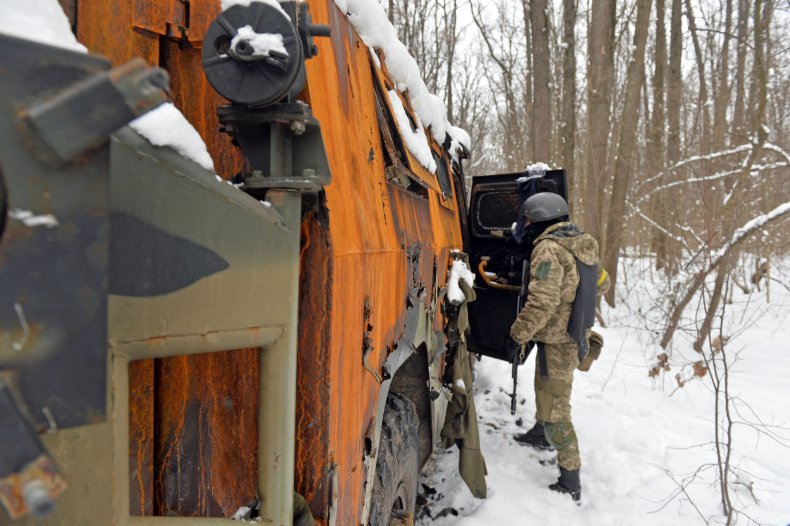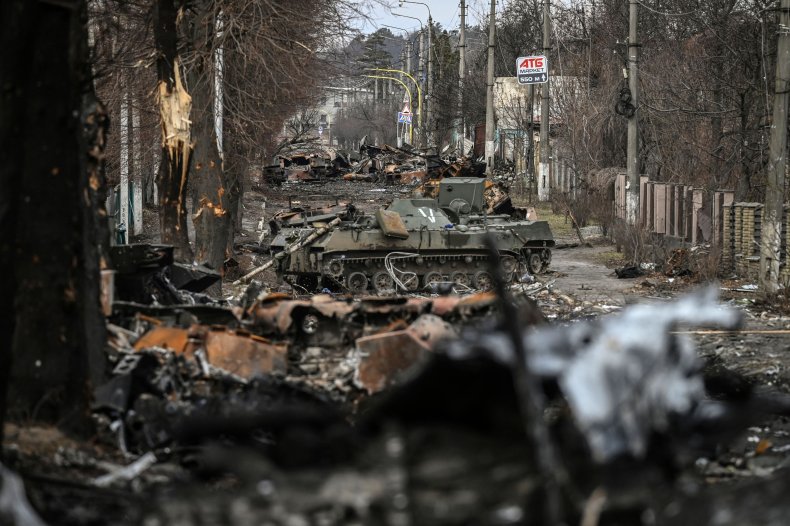Russia's military losses in Ukraine are a gold mine for US intelligence
Russia's Military Losses in Ukraine Are A Gold Mine for US Intelligence
By
Naveed Jamali ,
Tom O'Connor AND
David Brennan On 3/8/22 at 5:17 PM EST
Russian military equipment seized by Ukrainian forces throughout an explosive conflict poised to enter its third week may prove a gold mine for U.S. intelligence looking to get a rare look at Moscow's weapons and the encrypted command and control data they contain, current and former
U.S. military personnel told
Newsweek.
"The gear is huge," Mike Jason, a retired U.S. Army colonel who served in Afghanistan, Iraq and Kosovo, told
Newsweek. "It's like capturing an enigma machine."
The term refers to the cipher device employed by Nazi Germany during World War II to mask the Third Reich's secret communications, a code ultimately unraveled by the Allies, constituting a major intelligence advantage.
Now as Russian President
Vladimir Putin continues to argue today for the "denazification" of Ukraine through what he has deemed a "special military operation" decried by much of the international community as an unjustified invasion of the neighboring country, an opportunity may exist to listen in on Moscow's war effort.
Should Ukraine get its hands on such assets, Jason said there are "immediate implications" and "long-term implications," including those that involve the country's foreign backers.
Among the potential "immediate" impacts would be that Kyiv "can perhaps listen in right now to what is happening, then exploit in real-time," Jason said. One of the possible "long-term" effects he identified was that "the equipment can be reverse-engineered, say, sent to a major foreign intelligence exploitation lab, etc."
Here, Jason said, even seemingly innocuous devices such as radios, if still intact, could contain important so-called "crypto" information, giving an insight into Russia's encoded communications.
"And then," he added, "technology can be developed to jam and/or listen in, etc."
A member of the Ukrainian Territorial Defence Forces looks at what is said to be a destroyed Russian military vehicle in a forest outside Ukraine's second-biggest city of Kharkiv on March 7. U.S. officials told Newsweek that such assets may contain valuable insight into Moscow's encrypted command and control communications. SERGEY BOBOK/AFP/Getty Images
Given the active war effort, U.S. military officials have been reticent in speaking publicly about the extent to which intelligence was being shared between Washington and Kyiv. Reached for comment, a
Pentagon spokesperson told
Newsweek that "we have nothing to offer, as we do not speak to intelligence assessments."
But one U.S. cyberwarfare officer, who asked to remain anonymous, told
Newsweek that "we have covert folks attempting to acquire hardware all the time."
And, though no reliable figures as to the extent of Russia's military losses thus far have been made public, reports indicate they have been relatively substantial. Unverified footage promoted by official Ukrainian outlets has documented Ukrainian captures of the likes of Russian command and control vehicles, a T-72-tank-mounted TOS-1A thermobaric multiple-launch rocket system and a number of Russian aircraft, including the Su-34.
Ukrainian state-owned defense conglomerate Ukroboronprom even claimed Tuesday it would
offer sizable rewards for anyone willing to retrieve "stolen combat aviation equipment of the occupiers," including up to $500,000 for a captured military helicopter and $1 million for a warplane in working condition.
One particularly important alleged find for Kyiv was the Pantsir surface-to-air missile system, several of which have been said to have been taken intact by Ukrainian units. Jason said this would potentially be "a huge get," as it's assumed such a weapon "talks to friendly aircraft to deconflict friend-or-foe" and "would be tied to command and control systems at a high level."
There is certainly precedent for Ukraine to share captured intelligence and equipment with their U.S. partners.
"That is normal practice," former Ukrainian National Security and Defense Council chief Oleksandr Danylyuk told
Newsweek, noting that Ukraine's military and intelligence engaged in such exchanges during his time in office.
"I cannot tell you what it was, but it was very beneficial," Danylyuk said. "We were receiving some equipment in exchange...very high-tech as well," he added. "This co-operation works. And now we will be benefiting from this even more, because whatever the West learns about Russia will be helpful to us as well."
Asked by
Newsweek what the fate of such Russian equipment was once coming under Ukrainian control, a senior Ukrainian defense official who requested to not be named had a simple answer.
"It is recovered and used against the aggressor," he said.
A U.S. military aviator who also asked to remain unnamed gave some examples of the benefits of capturing enemy hardware.
"Getting actual equipment and manuals also helps with the human dynamic: how easy it is to operate, etc," the U.S. military aviator told
Newsweek. "Can any 'Joe Shmoe' use this, or does it require a Ph.D. to operate it at the same level as the glossy brochure?"
But this aviator also noted that there were limits to the amount of useful information that could be extracted from these systems alone in the modern era, when a nation like Russia would likely be quick to take action to avoid critical channels being intruded on.
"As systems move from analog to digital, the exploitation game changes a bit," the U.S. military aviator said. "The software and source code are the critical items, because you can find zero-day vulnerabilities and build a tool to attack it if/when the time comes."
As such, the U.S. military aviator said that "crypto gear is less important these days because the value is in the keys, and they change all the time."
But fears of U.S. equipment falling into Russia's hands likely also played into hesitance to send more advanced, expensive weapons systems to Ukraine, beyond the simpler platforms such as Stinger shoulder-fired surface-to-air missile systems, a number of which the Russian Defense Ministry claims to have already confiscated. Ukraine's military also said its navy sunk its own flagship last week, the frigate
Hetman Sahaidachny, to avoid capture by Russia.
Attempts by Washington and Moscow to obtain one another's equipment were a central theme of the Cold War, and continue to influence U.S. opposition to allies like Turkey and partners like India acquiring Russia's S-400 surface-to-air missile system while also seeking advanced U.S. platforms.
Last month, the Pentagon dismissed Russian news reports that Moscow had recovered a sonar countermeasure device from a U.S. Navy Virginia-class submarine after an encounter with Russian warships in the northern Pacific Ocean, with spokesperson Eric Pahon
telling Newsweek at the time that the claims were "nonsense and disinformation."
On Thursday, the Pentagon managed to complete an extensive operation to recover an F-35 fighter jet that had crashed earlier this year into the South China Sea, where the U.S.' stated top competitor on the world stage, China, operates extensively, and which it largely claims as its own territory.
Destroyed armored vehicles bearing the insignia of Russian military forces are seen in the city of Bucha, west of Kyiv, on March 4. ARIS MESSINIS/AFP/Getty Images
As the war in Ukraine drags on, both Kyiv and Moscow claim successes on a daily basis. But rampant misinformation and the fog of war have obscured efforts to discern the validity of either side's claims.
And despite their ongoing hostilities, representatives of Russia and Ukraine have also engaged in three rounds of talks hosted by Russian ally Belarus. Among the more immediate topics of discussion is the implementation of a ceasefire and humanitarian corridors to allow citizens to flee the conflict, which threatens to soon take on an even deadlier character as Russian troops push to encircle major cities, including the capital.
On Monday, Kremlin spokesperson Dmitry Peskov told Reuters that Moscow would end the war "this moment" should Kyiv agree to four core demands: an end to Ukrainian military action, recognition of the independence of the pro-Russia separatist-held Donetsk and Luhansk People's Republics in the eastern Donbas region, Russia's control of the southern Crimean Peninsula annexed in 2014 and an amendment to Ukraine's constitution to declare neutrality from military blocs, ending its bid to join the U.S.-led
NATO alliance.
In an interview with
ABC News, Ukrainian President
Volodymyr Zelensky later rejected what he called an "ultimatum" from Russia, but said his government had a "possible solution" to satisfy the conditions. To do so, however, he sought a direct line with Putin, who has not expressed any public plans to engage one-on-one with his Ukrainian counterpart.
This article has been updated to include comment from former Ukrainian National Security and Defense Council chief Oleksandr Danylyuk.














